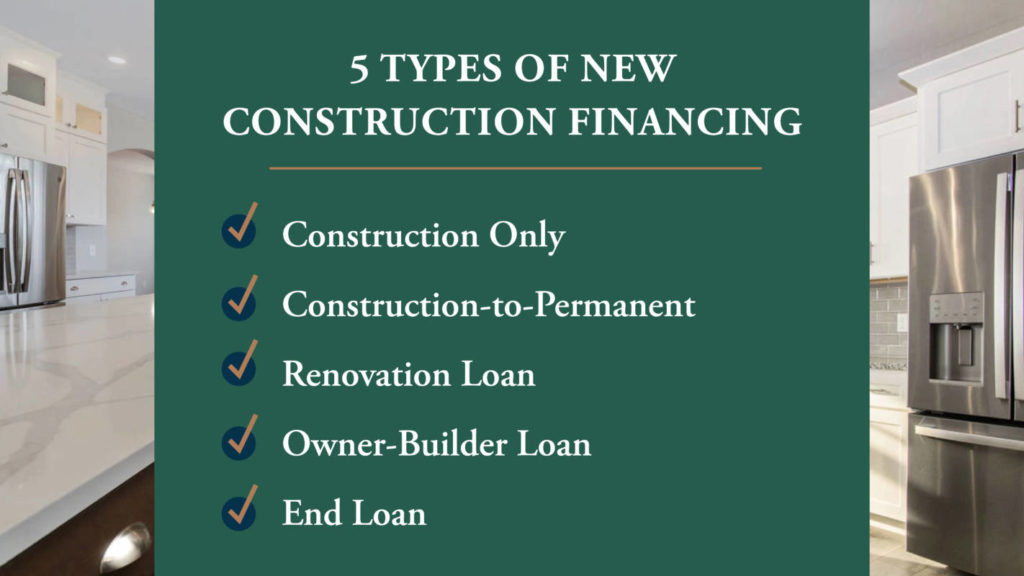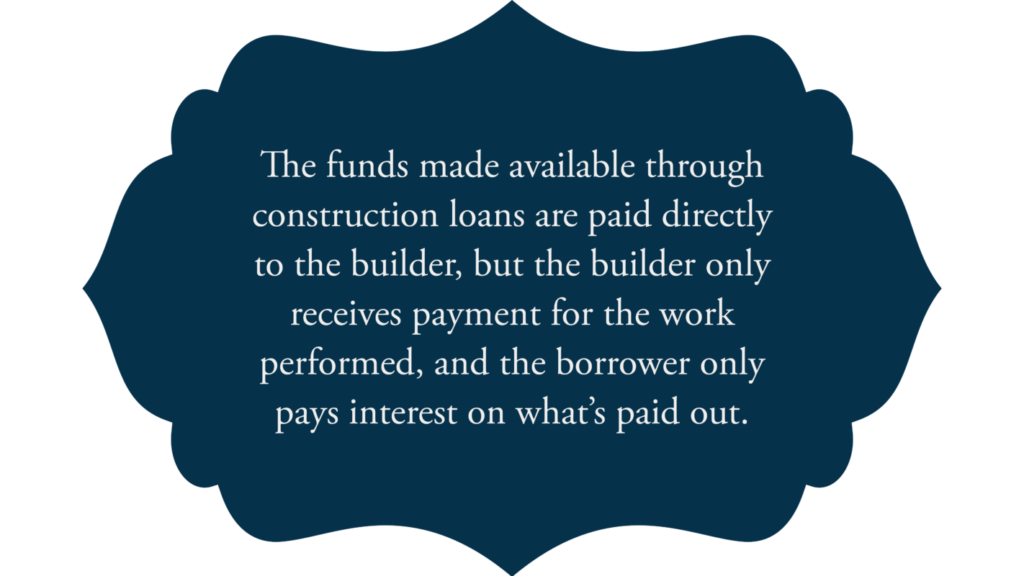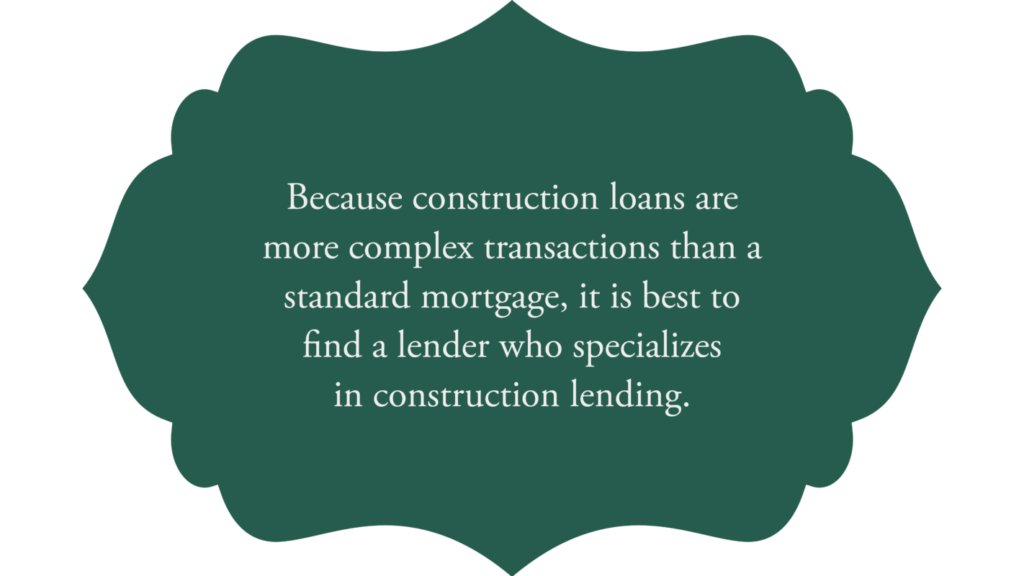What Do I Need To Know About Construction Loans For A New Home?
By AJ Jardiah
There are a lot of different routes you can take when it comes to becoming a homeowner. If you choose a new construction home, you’ll have several different options for financing. While you may already know some basic information about loans, did you know that there are specific types of loans for new construction homes?
For three generations, Bosgraaf Homes has built new construction homes throughout West Michigan. We understand that financing can seem daunting, but we’re here to help ease your worries. We’ll explain the types of new construction loans.
Helpful Tip #1: There are 5 Types of New Construction Financing
If you decide to build a new home, the process of borrowing money to pay for this project is different from getting a mortgage to move into an existing property. Talk to us about finding a lender who is experienced in this type of financing. Here are some of the different forms of new construction financing.

Construction Only. This type of loan is short-term, usually issued for a year. It’s meant to cover only the actual construction period. Many lenders don’t offer this loan because it is considered higher risk. These loans are harder to qualify for, and the interest rate will likely be higher than a traditional loan. In addition, you’d have to pay a second set of loan fees when you apply for a traditional mortgage.
Construction-to-Permanent. These loans are one-time loans that fund construction and then convert into a permanent mortgage. During the construction phase, borrowers make interest-only payments. These types of loans can be more expensive than traditional mortgages, so if you decide to go in this direction, shop around, compare rates and find the best deal before you pull the trigger.
Renovation Loan. These loans, also known as FHA 203(k) loans, can be used for home renovation and are insured by the Federal Housing Administration (FHA). This allows borrowers to both purchase and renovate their new home while still making one monthly payment to cover both costs. Conventional loan borrowers may qualify for these loans through Fannie Mae and Freddie Mac.
Owner-Builder Loan. Usually, when you build a home, there’s a general contractor who essentially acts as head of the whole operation. However, some prospective home builders wish to act as their own general contractor, and some banks offer owner-builder loans just for this purpose. These types of loans generally require the borrower to demonstrate through experience, education and licensing that they have the needed expertise to oversee the home’s construction.
End Loan. This is a traditional mortgage loan that a home buyer or home builder (if you’re building your own home) can apply for after the new home is constructed. You can get an end loan if construction is complete on the home. One positive aspect of an end loan is that the mortgage application for a newly constructed home is the same as it is for any other home.
Helpful Tip #2: The Qualifications for Loans for New Construction Homes
In order to qualify for a new construction loan, the borrower submits financials, plans, and project timelines. Lenders that offer construction loans require borrowers to:
- Get pre-approved. Getting preapproved for a construction loan can provide a helpful understanding of how much you will be able to borrow for the project. This can be an important step to avoid paying for plans or blueprints for a home you will not be able to afford.
- Be financially stable. To get a construction loan, you’ll need a low debt-to-income ratio and a way to prove sufficient income to repay the loan. You also generally need a credit score of at least 680.
- Make a down payment. You need to make a down payment. The amount will depend on the lender you choose and the amount you’re trying to borrow, but construction loans usually require at least 20 percent down.
- Have a construction plan. If you have detailed plans and a project schedule, especially if it was put together by the builder you’re going to work with, it helps lenders feel confident that everything will go according to that plan and that you’ll be able to repay the loan.
- Get a home appraisal. The finished home will serve as collateral for the loan, so lenders want to make sure the collateral will be sufficient to secure the loan. For that, they may require you to get an appraisal estimating how much the finished home will be worth.
- Get homeowners insurance. Even though you may not live in the home yet, your lender will likely require a prepaid homeowners insurance policy that includes the builder’s risk coverage. If something happens during the construction process, you are protected.
Helpful Tip #3: What Does a Construction Loan Cover?

The costs commonly covered by a construction loan include:
- Land
- Contractor labor
- Building materials
- Permits and inspections
- Appliances
- Landscaping materials and labor
The funds made available through construction loans are paid directly to the builder. But the builder only receives payment for the work performed, and the borrower only pays interest on what’s paid out. The design phase is not covered by a construction loan.
Helpful Tip #4: How Does a New Construction Loan Work?
New home construction loans work differently from regular mortgage loans. Usually, the borrower makes interest-only payments during the construction period while the loan is paying the contractors and subcontractors in regular installments based on how much work has been done. These installments are called “draws” because you’re drawing on the loan to pay costs. The draws can be paid as each significant part of the homebuilding process is completed or more frequently, when a line item or particular percentage is completed. For example, the builder may receive money when it is time to lay the foundation, install drywall, complete the roof or install plumbing.
Helpful Tip #5 Finding a Construction Loan Lender

Due to the risks, not every mortgage provider offers construction loans. Because construction loans are more complex transactions than a standard mortgage, it is best to find a lender who specializes in construction lending and isn’t new to the process. Before you begin the financing process, talk to us about our experienced preferred lenders. We have a vetted list of specific lenders and loan officers that are really adept at handling construction loans. They can help you with specific programs and procedures to ensure you’re getting the best possible deal for your situation. If you have trouble finding a lender, check out smaller regional banks or credit unions. They might be more flexible in their underwriting if you can show that you’re a good risk.
Bosgraaf Homes is Your Go-To Source for Your Newly Built Dream House!
This is just a quick overview, so always be sure to ask your lender any questions along the way. Learning about the different kinds of construction loans will help you understand a crucial piece of the home-buying puzzle. Boasgraaf Homes would love to be your go-to source for information about building a home in West Michigan. Take the first step to building your dream home today by contacting us. We can’t wait to hear from you!
